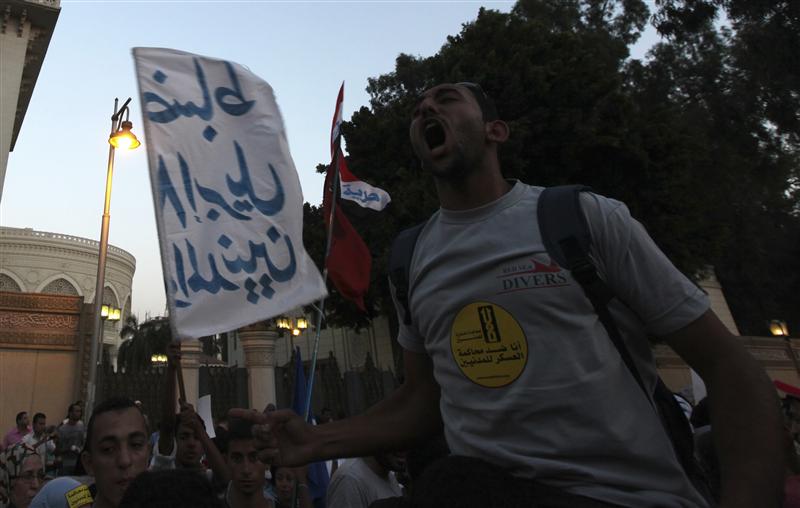Latest NEWS
- Aswat Masriya, the last word
- Roundup of Egypt's press headlines on March 15, 2017
- Roundup of Egypt's press headlines on March 14, 2017
- Former Egyptian President Hosni Mubarak to be released: lawyer
- Roundup of Egypt's press headlines on March 13, 2017
- Egypt's capital set to grow by half a million in 2017
- Egypt's wheat reserves to double with start of harvest -supply min
- Roundup of Egypt's press headlines on March 12, 2017
Egypt to try hundreds of civilians in military courts

Activists chant against military trials for civilians by the presidential palace - Reuters
CAIRO (Reuters) - An Egyptian prosecutor on Monday referred to a military court at least 339 alleged supporters of the banned Muslim Brotherhood, including four top leaders, judicial sources said, as the state expands a crackdown against political opponents.
Egypt expanded the jurisdiction of military courts in October to try civilians accused of acts ranging from attacking state facilities to blocking roads. That followed some of the worst assaults on security forces since last year's overthrow of President Mohammed Mursi of the Brotherhood.
The practice is seen by critics as another clampdown on dissent by a government that has jailed thousands of Brothers and targeted other activists.
It is a controversial issue in Egypt, where the armed forces play an influential role in both political and economic spheres. President Abdel Fatah al-Sisi was previously chief of the army, which toppled Mursi after protests against his rule.
The public prosecutor in the Suez Canal city of Ismailia referred 299 alleged Mursi supporters to a military court on charges of arson following the breakup by security forces of two Cairo protest camps in August 2013 when hundreds of people were killed.
The defendants included Brotherhood leaders Mohamed Badie, Essam El-Erian, Mohamed El-Beltagy and Safwat Hagazy, judicial sources said.
The prosecutor said earlier in the day that 40 defendants arrested in various incidents had been referred to military courts on charges of inciting violence and looting, blocking roads and belonging to a banned group.
They were also charged with breaking a law restricting protest, which has been used to imprison many of the leaders of the 2011 uprising that forced veteran autocrat Hosni Mubarak from power and ignited hopes for deeper change.
Egypt's top prosecutor on Saturday referred 139 alleged Brotherhood members in the southern province of Minya to a military court in relation to an attack on a police station following Mursi's ouster.
(Reporting by Stephen Kalin; Editing by Dominic Evans and Leslie Adler)










